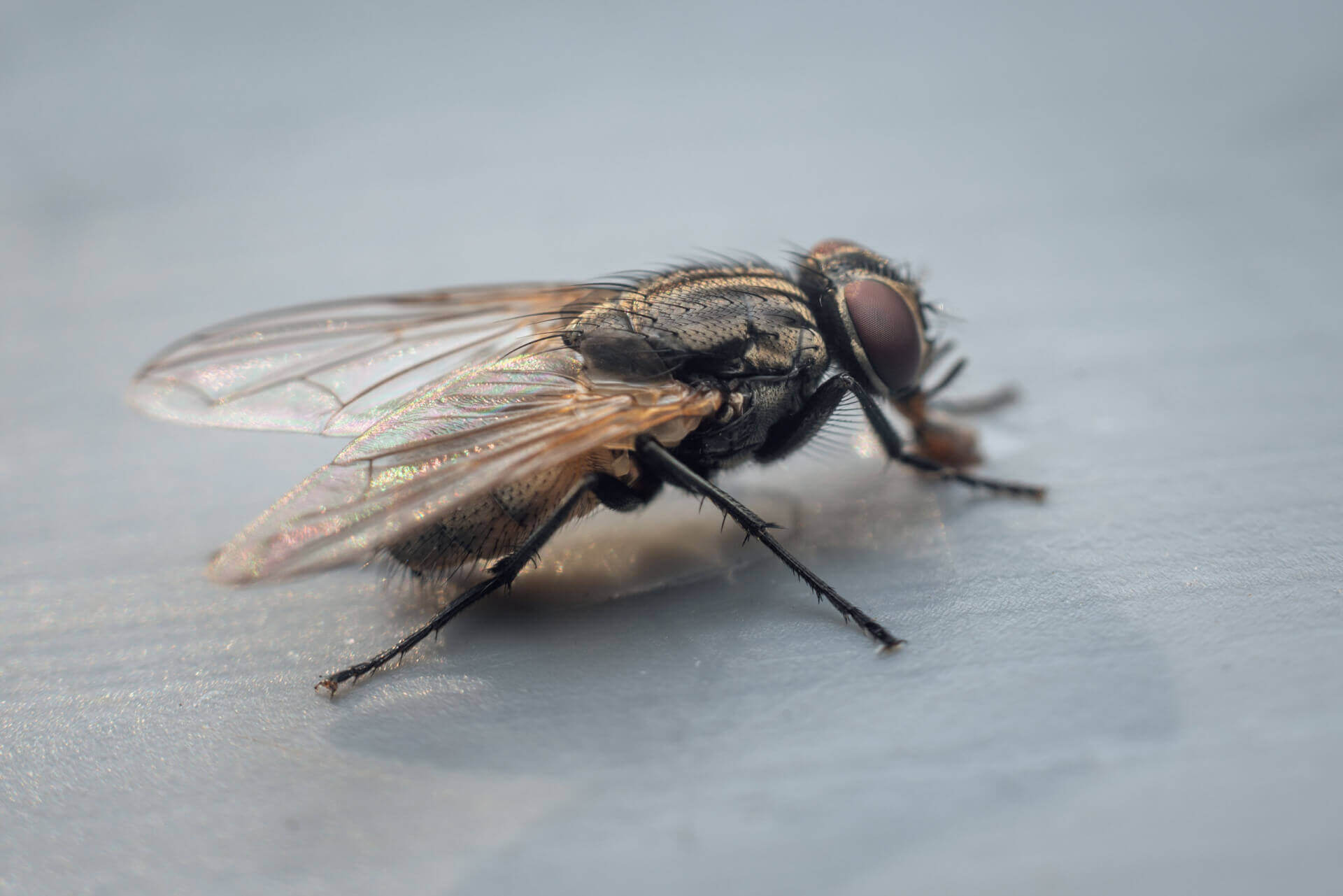House Fly Facts & Information
Everything you need to know about house flies
what do House Flies look like

House flies are usually gray in appearance and display four black stripes on their thorax. They have slightly hairy bodies, a single pair of wings, and compound red eyes. They clock in at about ¼ inch with the females growing to be larger than the males. Flies usually signify a larger sanitation issue that needs to be addressed so if a fly exterminator is telling you they can take care of them completely, they aren’t telling you the whole truth.
House fly eggs are deposited in decaying matter such as grass clippings, garbage, and human and animal excrement. Horse manure is the preferred breeding medium, but they aren’t all that picky. About l00-l50 eggs are deposited by each female on appropriate food. Eggs may hatch in 7 l/2 hours when temperatures are high enough to hit about 99 degrees F but it could take two days if the temperature is only 59 degrees F. Eggs hatch into worm-like creatures called maggots. Maggots lack definite heads, eyes, antennae, or legs. Their bodies are pointed at their front end and gradually widen at the rear.
Not the fly you have?
House fly eggs are deposited in decaying matter such as grass clippings, garbage, and human and animal excrement. Horse manure is the preferred breeding medium, but they aren’t all that picky. About l00-l50 eggs are deposited by each female on appropriate food. Eggs may hatch in 7 l/2 hours when temperatures are high enough to hit about 99 degrees F but it could take two days if the temperature is only 59 degrees F. Eggs hatch into worm-like creatures called maggots. Maggots lack definite heads, eyes, antennae, or legs. Their bodies are pointed at their front end and gradually widen at the rear.
Not the fly you have?
how did i get house flies
Every time you open a door or a window – even for just a moment – house flies can get in. They can also come in on packages, through tiny tears in screens, and through cracks and crevices in foundations, so professional exclusion work can help. Sanitation techniques can help as well. The house fly is the most common fly found in and around homes. It has a worldwide distribution and is prominent in the United States. House flies are not only nuisance pests while buzzing around homes, but they are potential disease carriers. House flies have short lifespans, but they can quickly reproduce in large numbers, leading to large house fly populations if not identified and effectively controlled. The most common sign of a house fly infestation is the presence of the flies, themselves. Larvae may also be seen crawling out of their breeding material as they pupate. Along with seeing house flies, people may hear them around the home. House flies produce a buzzing sounds which is a result of their two wings beating together.
what Problems do house flies cause
House flies are more than just a nuisance. They are known to carry over 100 harmful pathogens. Each time a fly lands on a surface, it leaves behind bacteria-laden materials that can transmit dangerous diseases such as E.coli, Salmonella typhi, Shigella, and Staphylococcus. They carry those pathogens on their bodies and in their body secretions, transferring them to wherever they land. They will also multiply quickly since the female house fly can lay up to 900 eggs in their 7–10-day life cycle. We can help with some fly treatments but ultimately, the fly control is about removing many of their attractants. We can educate you on what those are to help with fly control in the future.
House flies are strongly suspected of transmitting at least 65 diseases to humans, including typhoid fever, dysentery, cholera, poliomyelitis, yaws, anthrax, tularemia, leprosy and tuberculosis. Flies regurgitate and excrete wherever they come to rest and thereby mechanically transmit disease organisms.
House flies are strongly suspected of transmitting at least 65 diseases to humans, including typhoid fever, dysentery, cholera, poliomyelitis, yaws, anthrax, tularemia, leprosy and tuberculosis. Flies regurgitate and excrete wherever they come to rest and thereby mechanically transmit disease organisms.
how can i prevent house flies
Flies cannot breed in large numbers if their food sources are limited. So, don’t allow materials like manure, garbage, grass clippings, weed piles, or other decaying organic matter to accumulate. Keep trash cans clean and tightly covered. Be careful not to wash garbage cans where the rinse water might drain into the soil; flies can breed in soil full of organic matter. Dry out maggoty garbage or dispose of it in fly proof containers or landfills.
Flies can be kept outside of homes by the use of window and door screens. Make sure screens are tight-fitting without holes. Keep doors closed with no openings at the top or bottom. There should be no openings around water or gas pipes or electrical conduits that feed into your home. Caulk or plug any openings. Ventilation holes can be a way for flies to enter your home. Ventilation is important to maintaining adequate air circulation within your home as well, but screening must be used to exclude flies. Professional exclusion services can help with all that.
Flies can be kept outside of homes by the use of window and door screens. Make sure screens are tight-fitting without holes. Keep doors closed with no openings at the top or bottom. There should be no openings around water or gas pipes or electrical conduits that feed into your home. Caulk or plug any openings. Ventilation holes can be a way for flies to enter your home. Ventilation is important to maintaining adequate air circulation within your home as well, but screening must be used to exclude flies. Professional exclusion services can help with all that.
WHY WESTERN for house fly control
We’re passionate about controlling flies in your home or business because we live and work here – it’s our neighborhood, too. With our almost 100 years of experience keeping homes and businesses in Connecticut, Delaware, New Jersey, New York, and Pennsylvania safe from pests, Western has the experience you can trust.
100% Satisfaction Guarantee
24-Hour Guaranteed Response
Board Certified Entomologists
Need help with house flies?
GET A QUOTE
“We installed your Termite Defensive a number of years ago and have not seen even one termite since the system was installed.”
Edison, NJ
